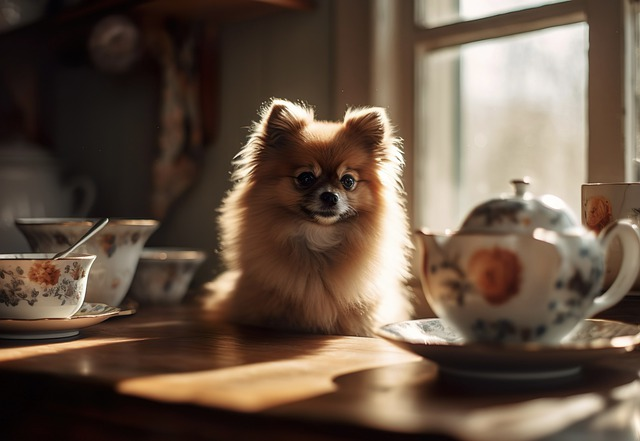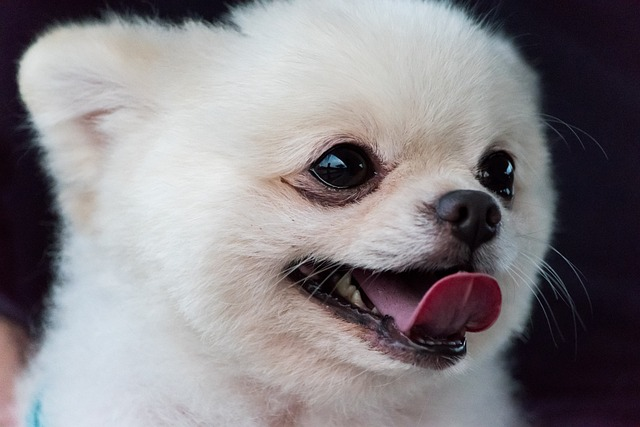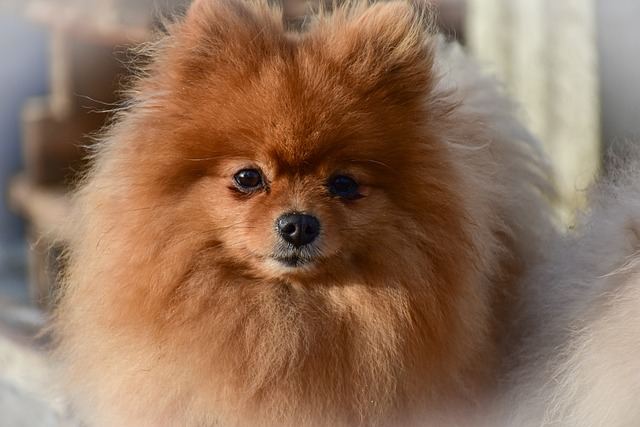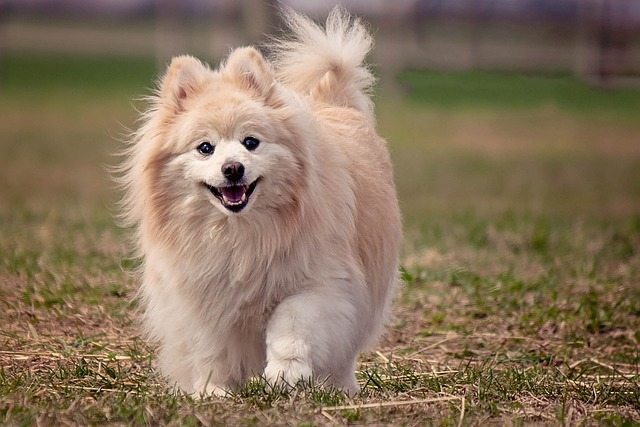Pomeranian Life Span: How Long Do Pomeranians Live? Discover Tips for a Happy, Healthy Companion!

Bringing a Pomeranian into your world is like embracing endless vitality, allure, and perpetual joy.
Known for their distinctive looks and lively personalities, these little furballs have won the hearts of dog lovers around the world.
As a Pomeranian parent, it’s natural to think about various aspects of your companion’s well-being, and one important aspect is their lifespan.
Just like any other breed, Pomeranians go through a wonderful journey from puppyhood to their golden years.
Understanding their lifespan involves more than just numbers – it’s about understanding the stages, maintenance, and factors that affect their longevity.
Whether you’re a new Pomeranian owner or just curious about these delightful companions, join us as we explore the intricacies of Pomeranian life span.
From their dynamic beginnings to the ideas that can help them thrive for years to come, we’ll explore them all.

How Long Do Pomeranians Live?
Teacup pomeranian, with their fluffy coats and lively personalities, is truly a delightful addition to any household.
As a responsible pet owner, it’s natural to wonder about their life expectancy and what you can do to ensure they lead a long, healthy, and happy life.
Let’s dive into the factors that influence the lifespan of Pomeranians and the steps they can take to maximize their years of companionship.
Average Pomeranian Lifespan
The average lifespan of a teacup pomeranian typically ranges between 12 to 16 years.
However, some teacup Pomeranians have been known to live even longer, sometimes reaching 17 years or more.
It’s important to note that individual lifespans can vary widely depending on genetics, care, and environmental factors.
Genetics and Breed-Specific Factors
Genetics plays a significant role in determining a Pomeranian’s lifespan. Like all purebred dogs, Pomeranians are prone to certain inherited health conditions.
These can include dental issues, heart problems, patellar luxation (knee dislocation), and tracheal collapse.
Being aware of your Pomeranian’s genetic background and addressing potential health concerns early on can greatly impact their quality of life and longevity.
Nutrition and Exercise
Providing your Pomeranian with a balanced and nutritious diet is vital for their overall well-being. Obesity can lead to a range of health problems, so maintaining a healthy weight is crucial.
Regular exercise, tailored to their energy levels and age, not only keeps them physically fit but also mentally stimulated.
Engaging in playtime, short walks, and mental challenges can help keep your Pomeranian sharp and active.
Regular Veterinary Care
Routine veterinary visits are essential to monitor your Pomeranian’s health and catch any potential issues early.
Regular check-ups, vaccinations, dental cleanings, and parasite prevention can contribute to a longer and healthier life.
Your veterinarian can also provide guidance on proper nutrition, exercise, and any specific care your Pomeranian might need based on their age and health status.
Dental Health
Pomeranians are prone to dental problems due to their small size and overcrowded mouths.
Poor dental hygiene can lead to various health issues, including heart problems, so it’s important to establish a regular dental care routine.
Brushing your Pomeranian’s teeth, providing dental treats or toys, and scheduling professional cleanings can help prevent dental-related complications.
Stress Management
Pomeranians are known for their lively and sometimes anxious nature. Stress and anxiety can impact their overall health and potentially shorten their lifespan.
Providing a calm and safe environment, socializing them from a young age, and using positive reinforcement training techniques can help alleviate stress and promote a sense of security.
Nurturing a Long and Fulfilling Life for Your Pomeranian
Your Pomeranian’s life span is influenced by a combination of genetics, care, and environmental factors.
By taking proactive steps to address their health needs, including regular veterinary care, a balanced diet, proper exercise, and stress management, you can contribute to their longevity and ensure they lead a happy and fulfilling life by your side.
Cherishing each moment with your Pomeranian and providing them with the love and care they deserve will undoubtedly result in a strong and lasting bond that transcends the years.

The Average Pomeranian Life Cycle
The journey of a Pomeranian from a tiny, fluffy ball of energy to a beloved and wise companion is a remarkable one.
Just like any other living creature, Pomeranians go through distinct life stages, each marked by unique developmental changes, needs, and characteristics.
Understanding the different phases of a Pomeranian’s life cycle can help you provide the best care and companionship at every stage. Let’s explore the typical life cycle of a Pomeranian:
1. Puppyhood (0 – 6 Months)
Pomeranian puppies are the epitome of cuteness. During this stage, they are incredibly curious, playful, and full of boundless energy.
Socialization is key during puppyhood, as it sets the foundation for their behavior and temperament in the years to come.
Introducing them to various people, animals, and environments helps them grow into well-adjusted adults.
Basic training, including commands like sit, stay, and recall, can also begin during this phase.
2. Adolescence (6 Months – 2 Years)
As your Pomeranian enters adolescence, you may notice a surge in their independence and testing of boundaries.
This stage is akin to the teenage years in humans. They might become a bit more stubborn and adventurous, making consistent training and patience crucial.
Continue to provide mental and physical stimulation through play, exercise, and engaging activities to help channel their energy constructively.
3. Adulthood (2 – 8 Years)
The adult phase is often considered the prime of a Pomeranian’s life. They have settled into their personalities and are generally more well-behaved.
During this time, they thrive on routine and enjoy a balanced lifestyle of play, exercise, and relaxation.
Regular veterinary check-ups, dental care, and proper nutrition become even more important to ensure they remain healthy and vibrant.
4. Senior Years (8+ Years)
As your Pomeranian enters their senior years, you’ll notice some changes in their behavior and physical abilities. They may slow down, become less active, and potentially develop age-related health issues.
Providing them with comfort, joint supplements (if recommended by a vet), and adjusted exercise routines can help them navigate this stage more comfortably.
Senior Pomeranians still enjoy companionship and love, and your presence becomes even more significant in maintaining their well-being.
5. Golden Age (10+ Years)
Pomeranians that reach the golden age are living testaments to the love and care they’ve received throughout their lives.
They may have some limitations, such as reduced mobility or hearing, but they continue to provide immense joy and companionship.
During this stage, focusing on their comfort, regular vet visits, and ensuring they’re mentally stimulated can greatly enhance their quality of life.
Nurturing Every Stage of the Pomeranian Life Cycle
Witnessing your Pomeranian transition through various life stages is a privilege and an opportunity to create lasting memories.
Each phase comes with its own set of challenges and joys, but by providing proper care, training, and love, you can ensure that your furry friend experiences a full and contented life.
Embracing their playful puppy days, navigating their rebellious teenage phase, enjoying their vibrant adulthood, and providing comfort during their senior and golden years – every moment spent with your Pomeranian contributes to a lifetime of companionship and cherished memories.

How to Prolong the Life of Your Pet Pomeranian?
As a devoted Pomeranian owner, you undoubtedly want your furry companion to enjoy a long, healthy, and vibrant life by your side.
While genetics certainly play a role in determining a Pomeranian’s lifespan, there are several proactive steps you can take to extend their years and enhance their overall well-being.
From proper nutrition to mental enrichment, let’s explore some essential tips for increasing the longevity and quality of life of your beloved pet Pomeranian.
1. Optimal Nutrition
A well-balanced and appropriate diet is fundamental to your Pomeranian’s health.
Consult your veterinarian to choose a high-quality dog food that meets their specific needs, considering factors such as age, size, and any medical conditions.
Overfeeding can lead to obesity, while underfeeding can result in nutritional deficiencies. Providing the right portions and avoiding excessive treats is essential for maintaining a healthy weight and preventing health issues.
2. Regular Exercise
Pomeranians may be small, but they are energetic and require regular exercise to stay healthy and happy.
Daily walks, playtime, and interactive toys not only keep them physically fit but also mentally engaged.
Tailor their exercise routine to their age and energy level, and always prioritize safety during outdoor activities.
3. Preventive Healthcare
Routine veterinary visits are crucial for early detection and management of potential health problems.
Regular check-ups, vaccinations, dental cleanings, and parasite prevention are all part of maintaining your Pomeranian’s health.
Addressing any health concerns promptly can significantly impact their longevity and quality of life.
4. Dental Care
Dental hygiene is often overlooked but plays a vital role in your Pomeranian’s overall health. Dental issues can lead to infections, pain, and even heart problems.
Establish a dental care routine that includes regular brushing, dental treats, and appropriate chew toys to promote good oral health.
5. Mental Stimulation
Engaging your Pomeranian’s mind is just as important as physical exercise. Provide puzzle toys, interactive games, and training sessions to keep their intellect sharp and prevent boredom.
Mental enrichment not only prevents behavioral issues but also contributes to a fulfilling and happy life.
6. Stress Management
Pomeranians can be prone to anxiety and stress. Create a calm and safe environment for them by providing a designated quiet space and avoiding exposure to loud noises or chaotic situations.
Positive reinforcement training techniques and socialization from an early age can help build their confidence and reduce stress.
7. Grooming and Hygiene
Regular grooming not only keeps your Pomeranian looking their best but also prevents skin issues and matting.
Brush their coat to prevent tangles, trim their nails, clean their ears, and bathe them as needed.
A well-maintained coat and proper hygiene contribute to their comfort and overall health.
8. Age-Appropriate Care
As your Pomeranian ages, their needs will change. Adjust their diet, exercise routine, and veterinary care based on their life stage.
Senior Pomeranians may benefit from joint supplements, softer foods, and more frequent vet visits to manage age-related conditions.
A Lifelong Bond of Love and Care
By embracing these tips and making them an integral part of your Pomeranian’s life, you’re not only extending their years but also enhancing their quality of life.
The bond between a Pomeranian and its owner is a cherished one, built on trust, love, and the commitment to provide the best care possible.
Every step you take to promote their well-being contributes to a joyful and enduring companionship that will leave a lasting imprint on your heart for years to come.

Common Pomeranian Health Issues
Pomeranians, with their vibrant personalities and luxurious coats, are adored by many as beloved companions.
However, like all dog breeds, Pomeranians are not immune to certain health issues that may affect their quality of life.
Being aware of these common health concerns can help you take proactive steps to ensure your Pomeranian’s well-being and provide them with the best possible care.
Let’s delve into some of the typical health issues that Pomeranians may face:
1. Dental Problems:
Pomeranians are prone to dental issues such as gum disease, tartar buildup, and tooth decay. Their small mouths and overcrowded teeth make them more susceptible.
Regular dental care, including brushing their teeth, providing dental treats, and scheduling professional cleanings, is crucial to prevent dental discomfort and related health problems.
2. Patellar Luxation:
Patellar luxation, or kneecap dislocation, is a common orthopedic issue in small breeds like Pomeranians. It can cause lameness, pain, and difficulty walking.
Depending on the severity, treatment might range from medication and physical therapy to surgical correction.
3. Tracheal Collapse:
Due to their small size and delicate trachea, Pomeranians are prone to tracheal collapse, a condition where the windpipe weakens and narrows, causing breathing difficulties and a characteristic honking cough.
Using a harness instead of a collar, maintaining a healthy weight, and avoiding strenuous activities can help manage this issue.
4. Heart Conditions:
Some Pomeranians may develop heart conditions, including mitral valve disease and congestive heart failure. Regular veterinary check-ups and screenings can help detect these issues early.
Medications, dietary adjustments, and lifestyle modifications can be recommended to manage these conditions.
5. Skin and Coat Problems:
Pomeranians’ beautiful double coats can be prone to skin issues, including allergies, hot spots, and dry skin.
Regular grooming, proper nutrition, and keeping them away from allergens can help maintain their coat’s health.
6. Eye Concerns:
Eye problems such as cataracts, tear duct issues, and dry eye can occur in Pomeranians.
Regular eye examinations, keeping their eyes clean, and seeking prompt veterinary care for any unusual symptoms can help safeguard their vision.
7. Hypothyroidism:
Hypothyroidism, a condition where the thyroid gland doesn’t produce enough hormones, can affect Pomeranians.
Symptoms include weight gain, lethargy, and skin problems. Regular blood tests can detect this issue, and medication can manage it effectively.

FAQs
1. Are Teacup Poms suitable as family dogs?
Teacup Pomeranians can make charming and affectionate additions to families, but there are factors to consider.
Their small size means they might be more delicate, requiring gentle handling, especially around children.
While their spirited personalities can bring joy to a household, it’s important to ensure they receive proper training and socialization from a young age to interact well with family members and other pets.
2. Do Teacup Pomeranians tend to be noisy?
Teacup Pomeranians, like their standard-sized counterparts, can be naturally vocal. Their alert and lively nature can lead to barking to express excitement, alertness, or sometimes even boredom.
However, their tendency to bark excessively can be managed through consistent training, positive reinforcement, and mental stimulation.
It’s essential to understand that any dog’s behavior, including barking, can vary based on individual personality, upbringing, and environment.
3. How do I take good care of my Pomeranian?
Caring for your teacup pomeranian involves several essential aspects to ensure their well-being and happiness:
- Nutrition
- Exercise
- Grooming
- Healthcare
- Training
- Socialization
4. What should I feed my Pomeranian?
Feed your teacup pomeranian a high-quality commercial dog food that suits their size, age, and activity level. Look for a balanced diet that includes protein, healthy fats, carbohydrates, vitamins, and minerals.
Consult your veterinarian to determine the best feeding schedule and portion sizes.
5. How often should I groom my Pomeranian?
Regular grooming is crucial to prevent tangles, matting, and skin issues. Brush your Pomeranian’s coat several times a week, trim their nails every few weeks, and clean their ears regularly.
Bathing should be done as needed, usually every 1-2 months, depending on their activity level and coat condition.
6. What kind of exercise does my Pomeranian need?
Teacup Pomeranians are energetic dogs that require daily exercise to stay healthy and happy.
Engage them in short walks, play fetch, provide interactive toys, and offer mental challenges to keep them stimulated. Tailor their exercise routine to their age and physical condition.

Conclusion
As we wrap up our exploration of the teacup pomeranian life span, it becomes evident that every stage of their life is a precious chapter in their shared journey.
From their playful puppy days to their golden years, your Pomeranian relies on your love, care, and commitment to thrive.
Understanding the average teacup pomeranian life span, the factors that influence their longevity, and the steps you can take to extend their years is not just about numbers – it’s about building a strong and enduring bond.
By providing proper nutrition, regular exercise, preventive healthcare, and addressing their unique needs at each life stage, you’re ensuring a vibrant and meaningful life for your furry friend.
Whether you’re a seasoned teacup pomeranian parent or a new enthusiast, the devotion and attention you invest in your companion’s well-being will undoubtedly be reciprocated with loyalty, joy, and unwavering companionship.
Cherishing the moments, adapting to their changing needs, and embracing each chapter of their life will create memories that resonate long after their paws have left an indelible mark on your heart.
